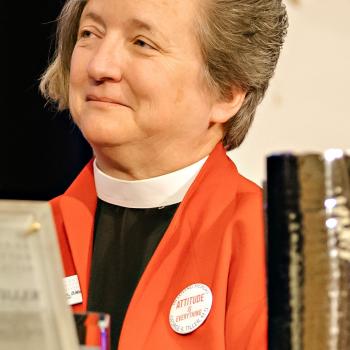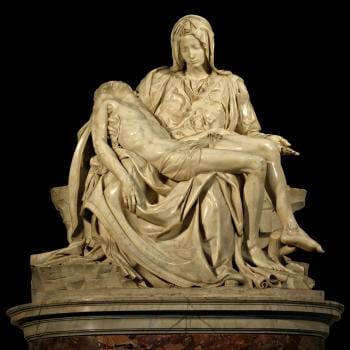For those who do not have much interest in debates about liturgy, I apologize that this blog has become rather ‘liturgically obsessed’ of late.
One of the things this debate has made me think about is the futility of argument in these matters. Some of my friends who love the Mass of Blessed John XXIII pull out all their arguments and keep on firing away. They sometimes express frustration that I don’t answer their arguments. At times I am accused of being woefully ignorant on these matters or indifferent.
The real reason I try to avoid liturgical arguments is because I think they’re pretty much a waste of time. This is not to say that liturgy is unimportant. Neither is it to say that my friends’ arguments are empty or just plain wrong. Because I don’t come out slugging away with my own arguments, I sense that they believe me to be more of their opponent than I actually am.
In fact, as I have said numerous times, I’m actually happy about the recent moto proprio. I’m glad the Mass of Blessed John XXIII is going to be celebrated more frequently. I hear many of the complaints of those who love the traditional Mass and agree with them. I hear and understand many of their liturgical arguments and agree with them.
Where I part company is when they cease to be positive about the Mass of Blessed John XXIII and start to be negative about the Ordinary Form of Mass. Much of this is down to one of my guiding principles that ‘a man is most often right in what he affirms and wrong in what he denies.’ I find the same thing holds true in my conversations with Protestants. When they are affirming good things about the Christian faith I am almost always able to affirm those good things with them. When they start denying things that are Catholic, then we part company because I want to affirm those Catholic things too. So, for example, I can affirm with my Protestant friend that we are saved by faith, but when he denies the need for faithful good works as our co-operation with God’ s grace, well then we part ways.
The second reason I try to avoid liturgical disputes is that they usually try to focus on ‘facts’ and ‘objective reasons’. However, in this sort of debate it is very rare indeed to find any argument that is purely objective, and the more a disputant claims that the argument is objective, the more I have found (certainly in my own case) that the argument is even more deeply subjective. This is because we argue most strongly for the things we feel most strongly about and when we feel strongly about something it makes the argument subjective–not objective. Then when we try to claim loudly that the argument is ‘just plain true’ or ‘simply objective’ it is usually the most subjective, and even more so because we can’t see ourselves the subjectivity of our argument.
Finally, there is the matter of perspective. Very often an argument is loud and long because each disputant really, honestly, sincerely does believe that he has got a handle on the facts that the other fellow has not. Since both disputants believe this to be true, and both cannot agree, then there must be something else going on. The other thing that is ‘going on’ is that they are not really arguing about facts at all. They are arguing about the interpretation of the facts. Both disputants are actually looking at the same set of facts, but because of their perspective and prior assumptions (and a whole load of other subjective baggage) they interpret the facts in very different ways.
You may remember the old story of the six blind men who were presented with an elephant. One felt his tail and said, “This is an old leathery piece of rope frayed at one end” A second felt the trunk and said, “It is a big snake!” The third felt the ear and said, “It is a large leather blanket” The fourth felt the leg and said, “It is a tree.” The fifth felt the side of the elephant and said, “It is a wall.” The sixth felt the tusk and said, “a piece of bone.”
All of them were right. All of them were wrong.
It’s the same with all these quarrels back and forth about liturgy and religion. I try not to get too involved because we’re not really arguing about facts, we’re arguing about the interpretation of facts.
Allow me to give an example from the present debate. Those who love Latin in the Mass point out quite rightly that Vatican II documents say that Latin should have ‘pride of place’ in the liturgy. They assume that this means quite clearly that Latin should be used regularly, if not exclusively, and that the Mass of Blessed John XXIII should be the norm. However, what does ‘pride of place’ mean?
If I have a priceless antique set of family china and crystal I give it pride of place not by using it every day, but by putting it in a beautiful china cabinet. There I can see it and appreciate it, but every day I use the ordinary, nice serviceable stuff from Wal-Mart. On special occasions we get the china and crystal out and set the table for a wonderful celebration, and this too is how we grant it pride of place. One could argue that this is what is meant by giving Latin and Gregorian chant pride of place. It is to be retained, kept in good condition and used for solemn high celebrations within our liturgical life.
One may not agree with this interpretation, but it is just as valid an interpretation of those words as the interpretation which thinks the Latin must be used always and everywhere.
Because we are ultimately arguing about interpretation rather than the text itself and the facts of the case, the results cannot be more than subjective, and the disputants end up disagreeing anyhow, and because their argument are subjective there is really no final and definitive answer. (no matter how much the disputants wish there were) When we do require a final and definitive answer in some interpretive matter we can both look to the Church and accept her ruling. But even then the arguments often continue because people cannot agree on the interpretation of the interpretation!
Therefore, I really do think that such arguments are not only a waste of time, but they are one of the devil’s favorite games. How delighted he must be to see Catholics spending inordinate amounts of time quarrelling over liturgy and calling each other names and getting hot under the collar over rites and rubrics and religion when they ought to be getting on with the joyful and awesome task of following Christ, and sharing his salvation with the world.











